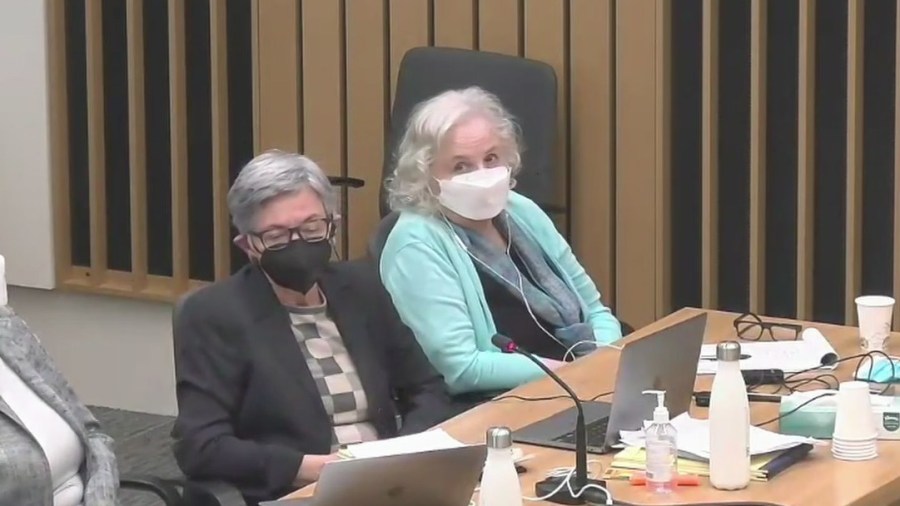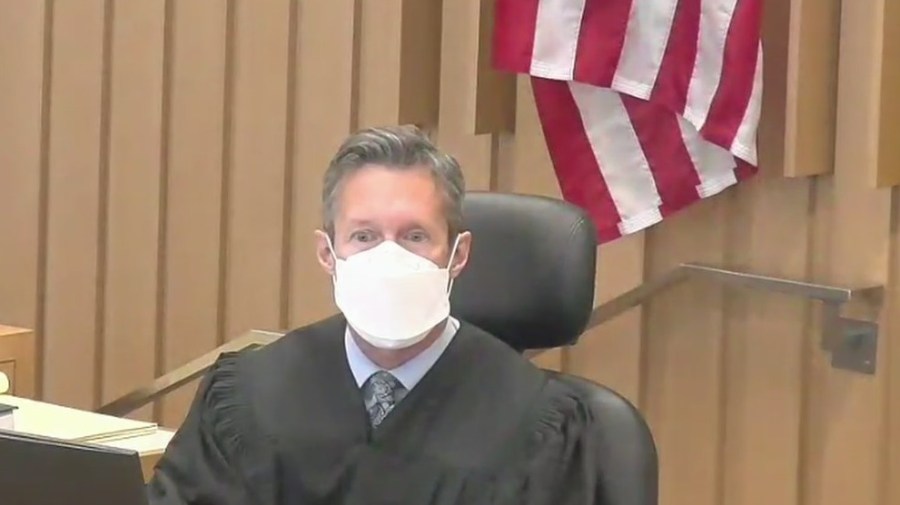PORTLAND, Ore. (KOIN) – Nancy Crampton Brophy, the Oregon romance novelist accused of murdering her husband, took the stand in her own trial Monday and began detailing her life with her husband before he was killed.
For more than 5 hours, the 71-year-old answered questions posed by her defense attorneys that focused on finances, yard work, loans and the overall state of their marriage. But the last question got to the heart of the trial.
“Did you kill Dan Brophy?” defense attorney Lisa Maxwell asked.
“No, I did not,” Brophy replied, without hesitation.
Over the course of questioning by her attorneys, Nancy Brophy became emotional at times during her testimony but was very calm and relaxed on the stand for the most part.
Watch: Nancy Brophy’s complete testimony lower in this article
The prosecution got in about 45 minutes of questions before Judge Christopher Ramras halted the proceedings for the day. Nancy Brophy is expected to resume her testimony at 9 a.m. Tuesday.
Crampton Brophy’s trial began April 4. Monday marked the 20th day of the trial.
Daniel Brophy, a chef and instructor at the Oregon Culinary Institute, was found dead inside the school on June 2, 2018. On September 5, 2018, his wife, Crampton Brophy was arrested.
Earlier in the trial, a prosecutor asked Detective Anthony Merrill, a lead detective in the case, if any leads ever led away from Nancy as the primary suspect. He said they did not.
Questions from her attorneys
Nancy Brophy was called to the witness stand shortly before 10 a.m. Monday.
In her testimony, Crampton Brophy described the first time she saw Daniel Brophy. She was attending Western Culinary Institute as a student at the time Brophy was teaching there.
She said Brophy was smart, funny, had a dry sense of humor and thought outside the box.
Crampton Brophy said she and her husband were each other’s cheerleaders and she never questioned his commitment to her.
When her defense attorney asked her what it’s like to be without him now, Crampton Brophy said, “It’s like you’ve lost an arm, like you’re not as good as you were when you were with him. You were the best you could be when you were together with him.”
Why their finances ‘went off the tracks’

Defense attorney Lisa Maxfield asked Crampton Brophy about when her and Brophy’s finances “went off the tracks” between 2014 and 2017. Crampton Brophy said around that time, Brophy lost several jobs he had been working at places outside of the Oregon Culinary Institute. She said he’d been teaching cooking classes at several places that either closed, remodeled, or went in another direction.
On top of that, Crampton Brophy needed eye surgery, Brophy had an expensive tooth implant put in, and their dog had a seizure and required veterinary care.
To remedy the situation, Crampton Brophy, who was selling life insurance policies at the time, wrote a life insurance policy on her husband to bring in a couple thousand dollars. She also borrowed money from an interest-free account.
But that wasn’t enough. The Brophys fell more than $8,000 behind on their mortgage payments and in September 2017, they decided to take a $35,000 loan out of Brophy’s 401K.
Crampton Brophy said she took more out than they needed to cover the mortgage because they were also planning to fix up their home to sell it and she knew they’d need the money for landscaping and house projects. After taking out the loan, they repaid credit card debt, made their mortgage payments and started working on the house.
By December 2017, Crampton Brophy said their financial pressure had been alleviated by the loan. She thought the plan she’d made with her husband to tackle their debts was working and said the money she’d made from selling Medicare plans late in 2017 would be coming in soon.
“I thought we were over the hump. I thought things looked good, so good that I was doing a little dance of happiness,” Crampton Brophy said.
She said she and Brophy took several trips around that time, including a cruise in Florida, a trip to Victoria, British Columbia, and a trip to Monterey, California in March 2018.
Her research process for writing
The defense asked Crampton Brophy about her research process for her writing. She explained that in the past, she’s purchased or borrowed odd items to observe them for books she was working on.
She said at one time, she held night-vision goggles as collateral from a coworker who owed her money and she wrote about them in one of her stories. She also said she had purchased different types of handcuffs for stories and traveled to Montana to look at a property she was considering using as the setting for a story she was mulling over.
Crampton Brophy admitted she spends a lot of money on her writing, but said her spending never bothered her husband.
In late 2017, Crampton Brophy said she read an article about a man who went online, bought parts to build a gun and killed his family. She started to brainstorm a story about a woman purchasing parts to build a gun.
Building a gun from a kit “was harder than Legos, but not much, according to this video.”
— Nancy Brophy
Crampton Brophy said she imagined the woman buying the pieces one at a time, but after a bit of research, she discovered someone could go online and purchase an entire kit with all the pieces in it. She said she visited GhostGuns.com several times to research the purchase.
She also watched a video on how to assemble the kit.
“It was harder than Legos, but not much, according to this video,” Crampton Brophy said.
She said Brophy was home at the time she purchased the gun kit. She said he encouraged her to purchase it.
Her attorney asked her how, in light of her decision to buy a gun, she felt when Dan was shot to death.
“Well in the lighter moments I thought it was karma kicking me in the ass,” she testified. “But in the heavier moments I thought, ‘We own a gun and it didn’t protect us. We bought a gun to protect us and it didn’t do its job.”
She also said she still talks to her late husband everyday.
“If I had been given the choice I would’ve much rather been the one that died than Dan because I think he would’ve done better than I’ve done on his own,” she said.
Questions from the prosecution
Prosecutors only had about 45 minutes to question Nancy Brophy before court recessed for the day. But in that time, she was peppered with questions about their life insurance policies and her statements to the police.

The assistant district attorney asked Brophy about the couple’s financial troubles and their life insurance coverage, which prosecutors said was excessive and expensive.
“You agree that you paid 6 times more for that policy than what you could’ve bought similar coverage for,” the prosecutor asked.
“I do,” she replied. “Purposely.”
Investigators said she tried cashing in on the life insurance policies just days after her husband was slain. She even asked a Portland detective for a letter, required by one of the insurance companies, to indicate she was not a suspect in the case.
“During that phone call with Detective Posey you only disclosed a $40,000 policy,” the ADA said.
“Yes. But he didn’t ask me about anything else,” she replied.
“I understand. I don’t think he even asked you about that. Isn’t it true that you just offered that it was just a $40,000 policy?”
“That’s true.”
“The smallest of all your policies?”
“No, it wasn’t the smallest. But it was a small policy.”
The rebuttal witness decision
Before Crampton Brophy’s testimony, the attorneys in the case and Judge Christopher Ramras discussed the controversial rebuttal witness the prosecution hopes to call. Prosecutors say Andrea Jacobs was in jail with Crampton Brophy and claims Crampton Brophy told her she was feet away at the time of the shooting.

The defense has argued that Jacobs is not a trustworthy witness and that she might be motivated to testify in order to benefit herself in a Medicaid fraud case she’s being investigated for. Jacobs is currently serving a prison sentence in Texas for crimes committed in Oregon.
The judge ruled the defense can ask Jacobs what years her previous criminal acts occurred, but cannot ask questions about specific acts she committed. They can also ask about her bias and if her testimony in this case will assist her negotiation.
The defense will also be allowed to call witnesses with knowledge of Jacobs’ dishonest reputation.
Ramras said what the prosecution can ask Jacobs will depend on what Crampton Brophy says in her testimony. If Crampton Brophy says she does not remember seeing Brophy killed or wasn’t there, but Jacobs says Crampton Brophy told her otherwise, then her testimony will be allowed.
KOIN 6 News will continue to follow this trial.
KOIN 6 News reporter Jenny Young contributed to this report